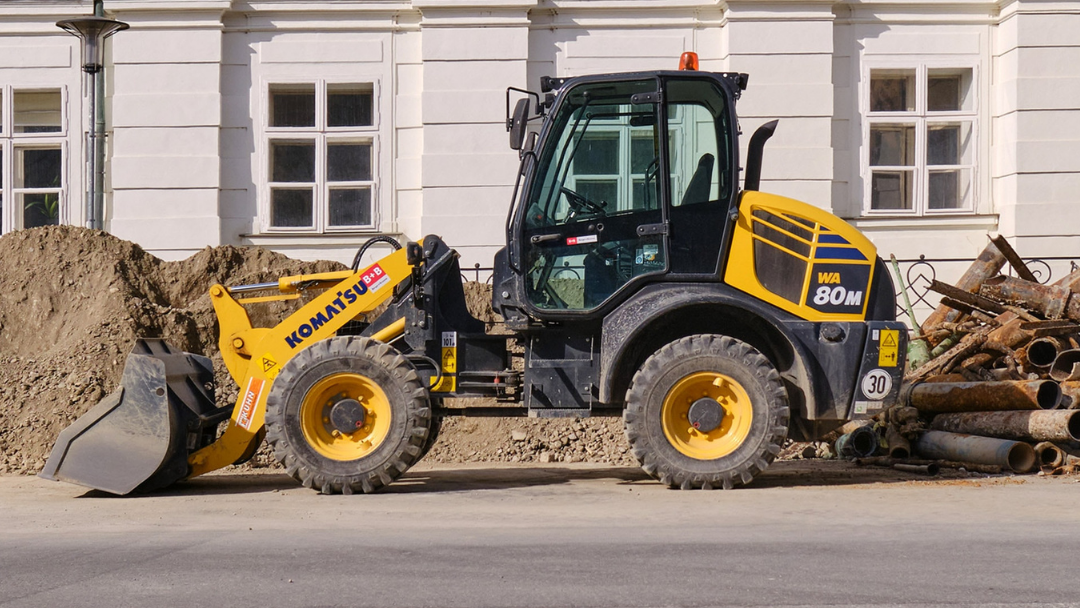WHEN THE WORKMEN ARRIVE AT SEVEN ON MONDAY MORNING, THEY FIND SISTER DOLORES, IN FULL HABIT, CHAINED TO THEIR BULLDOZER.
It isn’t the first time, either.
She was here on Friday, too, and stayed in this exact spot for half the day, until Sister Annunciata arrived with a briefcase full of legal arguments. Annunciata had gone to law school before joining the order and though she isn’t a lawyer, she knows how to talk like one. By the time the foreman figured out that her arguments weren’t really sufficient to stop work, the day was more or less over anyway.
“Sister, please,” the foreman complains, his voice tired and gravelly.
“You’ll be paid either way,” Dolores points out. “You have a good union.”
“But we have work to do,” he persists.
She understands. He wants the dignity of actually doing his job.
But Dolores is unmoved. She tugs with a smile at her padlock, telling him she hasn’t got a key. She is twenty-five and has the stamina to do this all day. The half-demolished church looms behind the bulldozer, looking even more ancient than it is.
“It’s been like this since the seventies,” she says. “What’s a day or two longer?”
Cyprus had been a war zone then, and bombs had remade much of the architectural landscape. This old church had stood, a ghost of its former self, for many a year since then.
He lights a cigarette while the workmen grumble behind him.
“Can you spare one of those?” she says, pointing to the cigarette in his mouth.
Clearly exasperated, he hands her one and starts to walk away.
“And a light, if you wouldn’t mind?”
He stops. She smiles beatifically. He lights her cigarette, and walks away, muttering in Greek. Dolores smokes until it’s nearly down to the filter and then tosses it into the dry, cocoa-colored dirt.
At mid-morning, Sister Barbara arrives, wearing jeans, boots, and a fuzzy cardigan, wimple intact. She confides to Dolores that she appreciates the theater of the full habit, but it’s simply not practical for walking around a demolition site. She passes out homemade peanut butter cookies as thick as a child’s fist and dispenses coffee from one of those portable cardboard jugs, disarming the surly workers with her sweet, youthful smile. Her tracks in the dark clay dirt are like a child’s next to theirs.
The workmen go quiet for a while, looking as if Barbara has erased their memories of their own mother’s cookies and supplanted them with these. Dolores could go for one of those biscuit-like transgressions herself; they’re filled with chocolate and peanut butter and Heaven knows what else, and it takes fortitude not to ask for one. But Barbara is the charm offensive, and Dolores the martyr.
Mother Superior had gotten the call on Thursday evening from a young local journalist named Thalia Demetriou, who was wondering if the sisters had seen what was inside the remains of the church about to be bulldozed. And now here they are.
The chain is roughly half an inch thick, knotted several times around one of the bulldozer’s tilt cylinders, the arms that lift its bucket, and then twice around her own waist.
The morning is cool, but around mid-day, the weight of it will start to become a drag in the most literal senses of the word.
Sister Annunciata arrives next, in her charcoal grey suit the same shade as her wimple. Dolores suspects her of having dyed the suit to match. Bespectacled, she makes her way across the dirt with a clipboard and speaks to the foreman in cool, official sounding tones.
“As you can see,” she hears Annunciata saying firmly, “it’s a cease-and-desist order.”
“A cease-and-desist order?” the foreman repeats, staring at her clipboard. “It’s a lunch menu.”
Annunciata’s face is implacable apart from the slightest raised eyebrow. “Is it?”
The sisters are known troublemakers: they have faced police lines at protests, sheltered dissidents. Sister Mary Dominic has been teaching self-defense to women in shelters lately. For good measure, they frequently take their business to the cardinal. Dolores suspects that the only reason they haven’t been excommunicated is Sister Barbara’s cookies.
The journalist, Thalia Demetriou, arrives a little while later. She appears beside Dolores: sandy colored hair poking out from under a hard hat, lips in a permanent smirk, camera around her neck. “Mind if I take a couple?” she asks, as if Dolores could do much about it if she did.
“I’ve seen you before,” Dolores comments, as Thalia Demetriou trains her lens on the spectacle of the chained nun.
“Yeah. I’m kind of a fangirl. If you guys are protesting, I’m all over it.”
“Aspiring nun?”
“Stone cold-atheist,” Thalia says. “I just appreciate how you guys are sticking it to the man.”
Dolores silently blesses the stone-cold atheist and asks her for a smoke, which the girl is all too happy to provide.
“Why did you contact us?” Dolores asks as she contemplates the smoke curling before her.
“As opposed to who?” Thalia responds. “I knew you’d care. I knew you’d do something. And you are.”
Frustrated, one of the other workmen starts the engine of a dump truck, as if it will somehow break the stalemate through the sheer power of its rumbling and growling. The clipped tones of Annunciata’s negotiations are swallowed by the noise. Dolores can see that the demure young nun is shouting to be heard but can’t make out a word of it.
Dolores knows that they will eventually give up and turn it off; the habit insulates her from behavior that another protestor might have no choice but to endure. They’re uncomfortable tormenting a nun. She smiles.
Sister Mary Dominic arrives in time to see Dolores leaning back against the dirty bulldozer’s bucket, sharing a cigarette with the young reporter. She’s in jeans and work boots like Barbara, carrying a large toolbox, and has an empty duffle bag over one shoulder. She leans in and says in Dolores’s ear, “You look like you’re having fun.”
She is. It delights her so much she’s sure it must be wicked. If she pictures herself rendered in stained glass, chained to a bulldozer, in the shadow of a ruined church, it can’t be helped. Her smile is a knife as she says, “I hope you know what you’re doing.”
Mary Dominic lays eyes on Thalia’s camera. “You,” she commands. “With me.”
Startled, Thalia responds to the authority of the tall, broad-built nun’s command and follows her, bewildered but fascinated.
The foreman protests from the edge of the lot: “You’re not supposed to go back there! It’s not safe! Also, it’s trespassing!”
“So? Call the cops!” Mary Dominic barks over her shoulder as she walks away.
The Cyprus skies are usually like polished turquoise, but today a thick white haze obscures the fuzzy disc of the sun as it ascends. So Dolores can hear the distant mutter of the helicopter’s rotors before she can see it. By the time it becomes visible, it already sounds like artillery fire. As it descends, Dolores decides there’s really only one person it can be.
The dust kicks up from where it lands in the middle of the lot, where the slow-moving apocalypse has been making its way to that last crumbling corner of old church that remains standing. She tastes it, feels it crusting unbidden inside her nose, blowing into her eyes and forcing her to close them. When she opens them, Cardinal Kefalas emerges from the chopper, his sunglasses casting Dolores’s mad reflection back at her, his red cassock stark against the white sky.
He looks like he’s immolating. Dramatic bastard, she thinks, fully aware of the irony of that thought existing in the mind of a nun chained to a bulldozer.
“Sister Dolores,” he scolds as he approaches. “I thought we understood each other.”
“I understood you perfectly,” Dolores replies.
“Then why are you here?” he demands irritably.
“Because you clearly didn’t understand me.” Dolores’s smile is now the one reserved for people she is blessing through clenched teeth.
“I told you that the Church has determined there is nothing else to extract from this site.”
“Yes. And I told you that the path was clear before me.”
The Church’s sense of time moves in decades and centuries, not minutes and hours. It will take a special council ten years to debate whether to change the color of the binding on the liturgy books, only to decide that it will stay the same. This site, having been mostly picked clean by smugglers fifty years ago, has escaped the Church’s notice for decades.
The cardinal tugs ineffectually at the chain around her waist. “Where is the key?”
“I don’t have it.” Mary Dominic has it and will not give it to a soul.
Silence falls at this moment. Dolores can instantly tell that the majority of the workmen on this site may or may not be regular churchgoers, but they definitely attended Catholic school.
Mother Superior has arrived, with her cane and her fierce scarred face, habit fluttering in the breezes, flinty eyes fixed on the cardinal. While none of the workers paid much mind to Kefalas’s arrival, despite his descending from the clouds, at Mother Superior’s appearance, they all stop talking, stop moving, and cross themselves.
“What is this?” she demands, gesturing at the completely unnecessary helicopter.
“I was on my way somewhere when I received the call,” he says defensively. Even he is a little afraid of her, despite her being almost a foot shorter.
Kefalas and Mother Superior have an intense back and forth. It’s no longer audible, because someone has started the dump trucks again. It seems they’ve decided that they may not be able to bulldoze, but they can begin other work.
Cookies and sandwiches can only stay the workmen’s hands for so long.
But Dolores doesn’t care. She knows what’s happening now. Inside that last crumbling corner of old church, Dolores can picture in her mind’s eye: Thalia Demetriou, junior reporter, taking photographs while Mary Dominic works. She is painting the tiles with glue, laying linen over the glue, digging into the wall with a chisel and a small hammer.
She can read Kefalas’s red face, his gestures, his jowly frustration. He’s probably saying, The Church has approved this property for demolition!
And the Mother, with her righteous fury coiled like a spring, responding, So then why can’t we do a little demolition by hand before you knock it all down?
Time passes in a strange, elastic way when one is chained to a bulldozer. Dolores shifts her weight from time to time, to allow different parts of her long, lank frame to bear the brunt of the work. She declines a cookie from Barbara because it will make her thirsty, and a bottle of water from Annunciata because it will make her need a bathroom. So for a while it’s Dolores, the vague white disc in the sky, creeping, and the occasional cigarette from a workman. The chain’s weight pulls at her bones, coaxes her toward the cocoa-colored dirt.
Sleek white police cars arrive, with the blue lights on top. The cops get out, and they deflate as they get a look at the scene: scattered workmen, a nun and a cardinal having it out in the middle of the dirt next to a helicopter, and Dolores. These lads in their pale blue summer shirts don’t look like they begin to have the appetite to deal with whatever this is.
But she’s done this sort of thing enough times. She wagers that they have a large set of clippers and plan to cut her chain and then drag her away. Mentally, she prepares for that eventuality.
They go first to the cardinal and Mother Superior, who most likely give them conflicting instructions. The foreman appears next to them and contributes what looks like yet a third set of instructions, or perhaps just complaints. Looking aggrieved and unsure, the officers walk back to their car. One of them produces the large chain-cutter from the trunk, and they approach her.
“Sister,” the young lieutenant says, “I’m told that we’re supposed to give you an opportunity to free yourself and let the men continue to work, or else we’ll have to cut that chain and arrest you.”
“Arrest me?” The absurdity. Does this boy even shave yet? “Is that meant to scare me?”
He shifts uncomfortably. “I’m sorry, Sister, please. I went to Catholic school. I don’t want to have to, you know… manhandle a nun.”
Dolores folds her arms. “Then don’t.”
A genuinely pained look crosses his face. “We have to get you off of this thing, though. That’s my job.”
“And this is mine. So it appears we have a problem.”
He rubs at the back of his neck. “Well, do you have a key?”
“I don’t.”
“Well, if I cut this chain, are you going to try to run?”
She gestures at her habit. “In this? How far do you imagine I’d get?”
He looks like he’s got a sense of being trapped, and doesn’t like it, and doesn’t know how to get out. “Well, if we arrest you, are you going to resist?”
He already knows the answer.
“Yes,” comes the voice of Thalia Demetriou. “She is.” She holds up her camera. “This is a really good camera. It’ll capture all the granular details of you guys roughing up a nun.”
He looks ready to cry.
But Thalia is here. And that means that Mary Dominic is too. Dolores cranes her neck around.
Thalia carries the toolbox, and Mary Dominic carries the duffle bag, which looks considerably heavier than it did when they went in –when? Hours ago? Mary Dominic’s arms flex with the effort of carrying it.
“Success?” Dolores asks.
“Yes.”
“Unlock me?”
Mary Dominic shrugs. “I don’t have the key.”
“I’m sure you don’t, wretch.” But Dolores is too tired, and too satisfied, to be angry.
Mary Dominic and Thalia approach her. The other sisters converge as well. Even Kefalas is there, peering over the shoulder of the tiny, fearsome Mother Superior.
“Well?” Dolores says impatiently. “I spent all day in chains for this, let me see.”
“Don’t act like you didn’t like it,” Mary Dominic responds dryly.
But, after shifting the bag around in her arms, she opens it to reveal two linen-wrapped, roughly square bundles. She pulls the linen aside and shows Dolores the fruits of their labor; a saint, a mother, a sword-wielding judge, preserved in mosaic whose edges have only just begun to crumble. A portrait of a mother of the early church.
Barbara traces her fingers over the Greek lettering: “Nephele.”
The monks might have written her out of their scriptures over the centuries, line by line obscuring her role in the story of God and man, but here she stands. She is preserved in tinted tile; mute, but indelible, a quiet monument to the faith of women and the ways in which the Church still rests on their shoulders. Ripped from the wall of a building that the Church was ready to consign to dust.
“Let me take them for the archives,” Kefalas says.
“They were almost archived once already today,” Mother Superior retorts.
The young police lieutenant stares at it in awed confusion. “They were going to destroy her?”
Dolores looks at the young cop. “Do you now see why we did all of this?”
He nods dumbly.
“New plan. Cut me loose and don’t arrest me, and we’ll all be leaving.”
He hesitates.
“Look, if she had the key, she’d unlock me, but she doesn’t. Just cut the chain. Hm?”
And like a good Catholic schoolboy, he gestures to the fellow with the clippers, and the jaws bite into the chain and free her.
The bulldozer at last begins to roll as Kefalas ascends into the hazy sky, as the young cops wander back to their car trying to figure out what just happened, as Dolores and her sisters make their way to the church van whose engine still turns over only by divine providence.
“Who was she?” Thalia asks Dolores as they walk.
“A Greek cloud nymph. Appropriated by the early church in order to ease conversions.”
“Why didn’t the Church think she was important to save?”
“Because history is written by the victors.”
And this may be so, Dolores muses. But its truths are preserved by the diligent, the clever, and those willing to dive into wreckage and wrestle with dust.
JENNIFER GIACALONE
Like what you’re reading?
Get new stories or poetry sent to your inbox. Drop your email below to start >>>
OR grab a print issue
Stories, poems and essays in a beautifully designed magazine you can hold in your hands.
GO TO ISSUESNEW book release
China Blue by Catherine Gammon. Order the book of which William Lychack Jeffries calls “a fiery declaration of all that is inexpressible about desire and loss and the need to find a home in a world in which even the most solid and real of things feel often less than completely solid or real.”
GET THE BOOK



